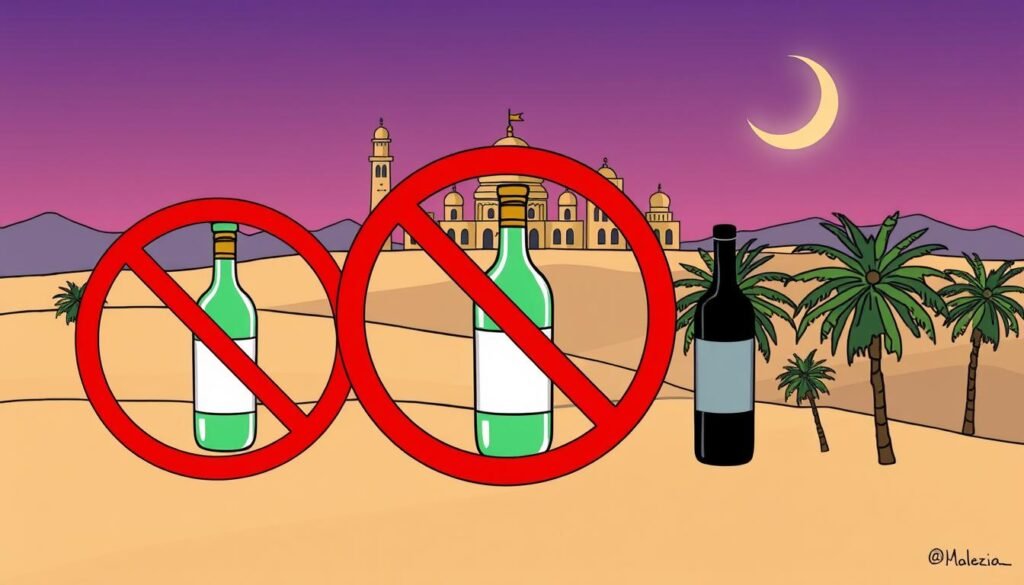Have you ever wondered why most Muslims don’t drink alcohol? It’s a big question that gets to the heart of their beliefs. It’s all about what’s allowed and what’s not in Islam.
The rule against alcohol is more than just a rule. It’s a way to keep people safe and healthy. It helps them stay clear-headed and make good choices.
Looking into this rule, we find important teachings from the Quran and sayings from the Prophet Muhammad. For example, a saying from Ibn ‘Umar says alcohol is forbidden. The Quran also warns against it, calling it a great sin.
This belief helps Muslims stay spiritually clean. It also keeps them physically and mentally well. It helps them live a balanced life, away from the dangers of alcohol.
Understanding the Concept of Haram in Islam
The term haram in Islam means actions that are forbidden by Islamic law. This comes from the Quran, the main guide for Muslims. It shows some actions are not just frowned upon but are strictly forbidden.
One big example is drinking alcohol. The Quran says alcohol might have some good uses, but Surah Al-Baqarah says the bad effects are much worse. Drinking alcohol can mess up your mind and body, leading to health problems.
Allah’s rules give Muslims a moral guide. They tell us to stay away from things that make us lose control. This message is very important in the community. It helps people live a balanced and good life.
Learning about halal and haram helps us understand Islamic law better. By avoiding haram, Muslims follow the Quran’s teachings. They live a life that values health, ethics, and peace.
Historical Context of Alcohol in Arab Culture
Alcohol has a long history in Arab culture. It goes back to ancient times. In old days, wine was more than just a drink. It helped people connect during parties and celebrations.
The significance of wine and spirits was huge. It was a key part of ceremonies. It brought people together, filling cups of hosts and guests.
Before Islam, drinking was common in Arabia. Rituals and feasts were filled with wine. These events were lively and full of joy.
But, with Islam, things changed. The new teachings brought a shift in views on drinking. They focused on being moral and ethical.
This change shows how social norms about alcohol evolved. It’s a story of seeking spiritual and social betterment. Islamic teachings aimed to guide towards these goals.
The Quranic Prohibition of Alcohol
The Quran guides Muslims, clearly stating its stance on alcohol. Surah Al-Ma’idah (5:90) calls intoxicants evil and warns against them. It shows that alcohol takes people away from good deeds and into wrong paths.
Scholars say these verses show alcohol’s bad effects on body and soul. They teach that alcohol harms us in many ways.
Alcohol is called khamr in Islamic texts. It’s seen as a harmful substance that clouds our minds. Drinking alcohol is not just forbidden; it also affects our prayers.
If someone drinks alcohol, their prayers are not accepted for forty days. They must truly repent to have their prayers accepted again. This shows how alcohol harms our spiritual connection.
The Quran’s ban on alcohol also affects society. Communities work to keep themselves safe from alcohol’s harm. They see it as a way to protect everyone’s well-being.
So, Islamic teachings encourage a life free from intoxicants. They urge followers to choose healthy habits for body and soul.
Why Can’t Muslims Drink Alcohol?
Islam bans alcohol based on the Quran and Hadith. Many Muslims choose not to drink because of the harm it causes. They also follow God’s guidance to keep their communities safe. 🌿
The Scriptural Basis for Prohibition
Islamic texts clearly say no to intoxicants. The Quran and Hadith say anything that makes you drunk is forbidden. Prophet Muhammad warned against drinks that make you drunk.
He said even a little can harm your morals and judgment. This goes against what Islam teaches. Alcohol is seen as a danger that messes with your mind and makes it hard to tell right from wrong.
The Role of Allah’s Messages against Intoxicants
Allah’s words about alcohol are to protect us and our communities. The Quran says alcohol leads to bad things like addiction and crime. It’s like a key to all evil.
Today, alcohol is linked to health problems and accidents. It causes a lot of deaths. Not drinking is good for your health and morals.
Islamic Perspectives from Hadiths on Alcohol Consumption
Hadiths give us a deep look into why Islam bans alcohol. They show how the Prophet Muhammad warned about alcohol’s dangers. He said drinking can make your prayers not accepted for a long time.
This warning is not just about prayer. It also talks about the big impact drinking has on society.
Hadiths teach Muslims to stay away from alcohol. Many articles talk about alcohol’s effects in Islam. In Malaysia, 75% of Muslims are unsure about alcohol, showing the need for clear teachings.
Looking into Hadiths about alcohol, we see a lot of study on this topic. Half of the studies look at alcohol’s history in Shariah. They use Hadith and Quran to show alcohol’s bad effects.
Health Concerns Related to Alcohol Consumption
Alcohol is more than just a topic for religious debates. It’s also linked to serious health issues. Many, including Muslims, avoid alcohol because of these risks. They worry about its effects on their bodies and minds.
Physical Health Risks Associated with Alcohol
Many studies show alcohol can lead to serious health problems. Drinking can harm your liver and heart. It also increases the risk of cancer.
Looking at the facts, alcohol’s impact on health is clear. It’s not just a spiritual issue. It’s also about keeping your body healthy.
Mental Health Implications of Alcohol Abuse
Alcohol and mental health are closely tied. Drinking can make anxiety and depression worse. It can also lead to poor judgment and more harm to your mental state.
Knowing these risks helps show why avoiding alcohol is wise. It’s not just about staying sober. It’s about protecting your mental health too.

Alcohol and Daily Religious Practices in Islam
Daily rituals like Salah (prayer) are very important for Muslims. Alcohol and these rituals have a complex relationship. It affects one’s spiritual duties.
Drinking alcohol can mess with your body and mind. This makes it hard to pray sincerely.
The Impact of Alcohol on Salah (Prayer)
Praying five times a day is key in Islam. Drinking alcohol makes it hard to focus during prayer. A clear mind is needed for a strong spiritual connection.
The Quran says believers should avoid things that cloud their judgment. Drinking alcohol makes it hard to pray well.
Ablution and Alcohol: Spiritual Considerations
Ablution is another important Islamic practice. It’s needed before prayer to be pure. Alcohol is seen as impure in Islam.
It breaks the purity needed for prayer. Being pure in body and spirit helps in sincere prayer.
Diverse Attitudes Towards Alcohol in the Muslim World
The Muslim world’s view on alcohol is interesting. It mixes tradition, culture, and modern ways. Most Muslims don’t drink because of their faith. But, different places and groups have their own views and actions towards alcohol.
Surveys and Statistics on Drinking Among Muslims
Studies show Muslims often see drinking as wrong. But, in some places, things are different. For example, in the U.S., about 46% of Muslim college students drink. And 14% say they binge drink.
This shows a big gap between what Muslims believe and what they do. Muslim communities face special challenges. They try to follow their faith and deal with today’s world.
Regions Where Alcohol Is More Permissible
In some places, like the Gulf Cooperation Council (GCC), drinking is more accepted. This is very different from more strict areas. This difference leads to talks about blending cultures and staying true to Islam.
Learning about these differences helps us understand Muslims’ views on alcohol. It also shows how alcohol affects identity and community.
Alcohol Regulations in Islamic Countries
Islamic countries have strict rules about alcohol. These rules mix religious beliefs, cultural norms, and government laws. Each country has its own way of following these rules, showing how different Islamic teachings are seen in various places.
The Strictness of Laws in Saudi Arabia
Saudi Arabia has a total ban on alcohol. This rule applies to everyone, locals and visitors. Breaking this law can lead to jail time and even physical punishment.
This strict rule shows how deeply Saudi society follows Islamic teachings. It shows the importance of sticking to Islamic rules in their culture.
The Looser Tradition in Modern-Day Dubai
Dubai, on the other hand, has more relaxed rules about alcohol. You can find alcohol in hotels, bars, and restaurants. This is mainly for expats and tourists.
This shows how some Islamic countries adjust their rules for the economy and global trends. Dubai’s rules show a balance between keeping to Islamic values and embracing modern life.

Social Stigmas and Challenges of Alcohol Consumption
Alcohol use in Muslim communities faces a lot of social stigma. People who drink often get judged harshly by their friends. This makes it hard for them to share their choices without facing backlash.
This stigma affects how people see themselves and behave. It’s a big part of the problem in Muslim communities.
The Stigma Surrounding Alcohol Drinking in Muslim Communities
Drinking alcohol is a big debate in faith and culture. Those who try drinking might feel left out. Admitting to drinking can lead to being shunned.
This makes many hide their drinking. It’s a big problem that hurts mental health and community bonds.
Peer Pressure and Its Effects on Muslim Youth
Peer pressure is tough for Muslim teens. They face old values and new, secular lifestyles. This makes choosing what to do about alcohol very hard.
Some teens want to fit in with their friends. But others worry about their faith and culture. This struggle can cause a lot of stress and identity issues.
We need to talk about these issues openly. We should also provide education that promotes understanding and kindness. This can help reduce the stigma around alcohol.
For more on this, look into how community and education help with healthy lifestyles. This is important for understanding Muslim culture better.
Explore insights on related social issues to learn more about cultural influences on alcohol use in Muslim communities.
Cultural Adaptations and Modern Society’s Influence
Looking at modern Muslim culture, we see faith and lifestyle blending. This is true for alcohol use. Global changes are making it hard for young Muslims to follow old values and new ways.
Studies show that being part of society can make Muslims feel less left out. When Muslims share Western values, they challenge alcohol stereotypes. They also show how to keep Islamic identity in a modern world.
But, how do we mix old traditions with new norms? Alcohol stories in Muslim groups show a balance between faith and society. Even though Islam bans alcohol, talks show a community trying to understand its faith in today’s world. This helps us see how culture and alcohol use change in Muslim communities.
FAQ
Why is alcohol consumption prohibited in Islam?
What does "haram" mean in the context of alcohol?
How has the historical context of alcohol shaped its prohibition in Islam?
What specific verses in the Quran address the issue of alcohol?
What does Islamic scripture say about alcohol?
How do Hadiths enhance our understanding of alcohol consumption in Islam?
What are the health risks associated with alcohol consumption?
How does alcohol impact daily religious practices in Islam?
Are Muslims’ views on alcohol consumption uniform across the globe?
What are the alcohol regulations in Islamic countries?
What social stigmas exist surrounding alcohol consumption in Muslim communities?
How are cultural adaptations influencing the modern Muslim perspective on alcohol?

Embracing Faith, One Insight at a Time!
The teachings of the Quran have always guided my path. With a deep passion for Islamic knowledge, I strive to blend the wisdom of tradition with the relevance of today, making the timeless messages of Islam accessible and meaningful for everyone.
Muslim Culture Hub is my platform to share historical insights and thought-provoking articles, exploring both well-known and lesser-discussed aspects of Islamic culture and beliefs. My mission is to create an inclusive online space where everyone can learn, strengthen their faith, and connect with the profound message of Islam.
Join the journey!
May peace be upon you.








